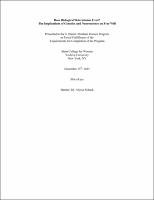Please use this identifier to cite or link to this item:
https://hdl.handle.net/20.500.12202/4220| Title: | Does Biological Determinism Exist? The Implications of Genetics and Neuroscience on Free Will |
| Authors: | Kaye, Shira |
| Keywords: | Free will and determinism. Neurosciences. Behavior genetics. Epigenetics. Human genetics. Human behavior. |
| Issue Date: | Dec-2015 |
| Publisher: | Stern College for Women |
| Abstract: | The issue of free will is a philosophical problem dating back almost to the origins of philosophical questioning. It is difficult to reconcile human capacity for free will with the idea of determinism, meaning everything in the world is determined because every action has a previous cause. Due to the arrival of the scientific revolution, and more specifically, discoveries in biology, the existence of free will seems to be negated. Genetic discoveries appear to show that everything from eye color to personality traits are determined by DNA, implying that we do not have free will to choose how to behave. Neuroscience seems to demonstrate that our brains make decisions without our input, with the pre-frontal cortex controlling how we act. Although biological determinism appears to exist, through deeper analysis of genetics and epigenetics, philosophical theory, and neuroscientific evidence, it is apparent that human beings retain free will in certain situations and to a certain extent. There are times when the brain is not controlled by determinism, when human beings have the capacity to choose, free of genetics and the influence of the brain. |
| Description: | The file is restricted for YU community access only. |
| URI: | https://hdl.handle.net/20.500.12202/4220 https://ezproxy.yu.edu/login?url=https://repository.yu.edu/handle/20.500.12202/4220 |
| Appears in Collections: | S. Daniel Abraham Honors Student Theses |
Files in This Item:
| File | Description | Size | Format | |
|---|---|---|---|---|
| Shira-Kaye.pdf Restricted Access | 237.6 kB | Adobe PDF |  View/Open |
This item is licensed under a Creative Commons License

